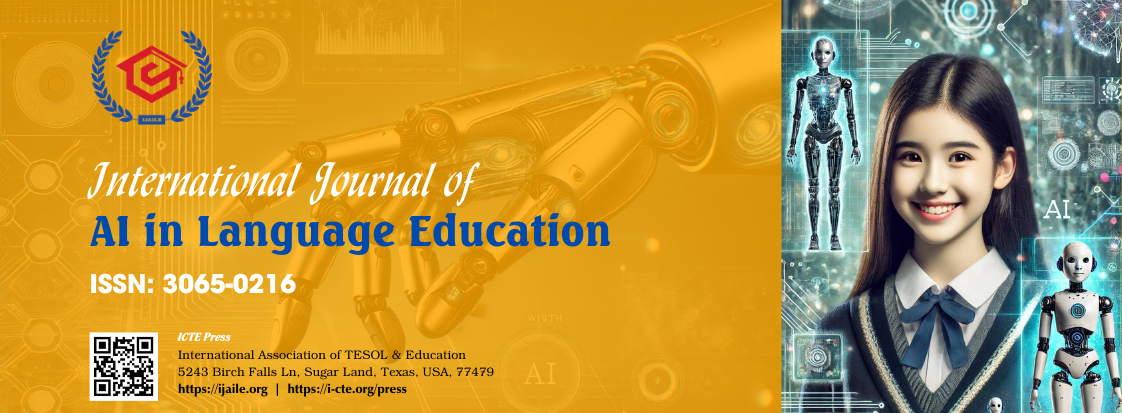The Effects of Integrating Artificial Intelligence into Learning Academic Vocabulary Among Masters in English Studies Students
DOI:
https://doi.org/10.54855/ijaile.24111Keywords:
AI; Artificial intelligence; academic vocabulary; using AI to learn academic vocabularyAbstract
Artificial intelligence (AI) adaptation in education has been increasing recently. Therefore, multiple studies have been conducted on its potential benefits and usage in education. Moreover, the need to acquire academic vocabulary for students in the English Language to serve their academic goals also received multiple attention. However, few research studies mention the effectiveness of using AI to learn academic vocabulary among graduate students. The research aimed to bridge the gap by examining AI's effects on the academic vocabulary acquisition of students studying for a master’s degree in English studies and to what extent it is used. This brings light to the differences AI creates in the students' learning process. Qualitative data were collected in the form of questionnaires given to the Master's program students in the Faculty of Foreign Languages at Van Lang University. The questions centered around using AI tools to learn academic vocabulary.References
Hong, W. C. (2023). The impact of ChatGPT on foreign language teaching and learning: Opportunities in education and research. Journal of Educational Technology and Innovation, 5(1). DOI: https://doi.org/10.61414/jeti.v5i1.103
Dewi, H. K., Rahim, N. A., Putri, R. E., Wardani, T. I., & Pandin, M. G. (2021). The Use of AI (Artificial Intelligence) in English Learning among University Student: Case Study in English Department, Universitas Airlangga. DOI: https://doi.org/10.31235/osf.io/x3qr6
Xodabande, I., & Atai, M. R. (2022). Using mobile applications for self-directed learning of academic vocabulary among university students. Xodabande, I., & Atai, M. R. (2022). Using mobile applications for self-directed learning of academic vocabulary among university students. Open Learning: The Journal of Open, Distance and e-Learning, 37(4), 330-347. DOI: https://doi.org/10.1080/02680513.2020.1847061
Kamola, K. (2023). ACADEMIC VOCABULARY: HOW TO TEACH AND STUDY IT. Modern Science and Research, 2(9), 79-83.
Kohnke, L., Moorhouse, B. L., & Zou, D. (2023). ChatGPT for language teaching and learning. RELC Journal. DOI: https://doi.org/10.1177/00336882231162868
Ayala-Pazmiño, M. F., & Alvarado-Lucas, K. I. (2023). Integrating Artificial Intelligence into English Language Education in Ecuador: A Pathway to Improved Learning Outcomes. 593 Digital Publisher CEIT, 8(3-1), 679-687. DOI: https://doi.org/10.33386/593dp.2023.3-1.1862
Kieu, V. L., Anh, D. T., Tran, P. D., Nga, V. T., & Ho, P. V. (2021). The Effectiveness of Using Technology in Learning English. AsiaCALL Online Journal, 12(2), 24-40.
Cabrera-Solano, P., Quinonez-Beltran, A., Paul Gonzalez-Torres, C. O.-C., & Castillo-Cuesta, L. (2020). Enhancing EFL Students’ Active Learning by Using ‘Formative’ on Mobile Devices. International Journal of Emerging Technologies in Learning (iJET), 15(13), 252–263. DOI: https://doi.org/10.3991/ijet.v15i13.13975
Lei, H. (2022). High School Students’ Foreign Language Vocabulary Acquisition in the Era of Artificial Intelligence. 2021 International Conference on Education, Language and Art, 659-662. DOI: https://doi.org/10.2991/assehr.k.220131.121
Kol, S., Schcolnik, M., & Spector-Cohen, E. (2018). Google Translate in Academic Writing Courses. The EuroCALL Review, 26(2), 50-57. DOI: https://doi.org/10.4995/eurocall.2018.10140
Sharma, P. (2023). The use of AI in English Learning among students: Case study in English Department.
Alhojailan, A. I. (2019). The Effect of Using Academic Vocabulary on Graduate Students’ Achievements in Their Assignments. English Language Teaching, 12(9), 33-41. DOI: https://doi.org/10.5539/elt.v12n9p33
Liu, P.-L., & Chen, C.-J. (2023). Using an AI-Based Object Detection Translation Application for English Vocabulary Learning. Educational Technology & Society, 26(3), 5-20.
Alsadoon, R. (2021). Chatting with AI Bot: Vocabulary Learning Assistant for Saudi EFL Learners. English Language Teaching, 14(6), 135-157. DOI: https://doi.org/10.5539/elt.v14n6p135
Mahmud, F. A. (2023). Investigating EFL Students' Writing Skills Through Artificial Intelligence: Wordtune Application as a Tool. Journal of Language Teaching and Research, 14(5). DOI: https://doi.org/10.17507/jltr.1405.28
Nguyen, T. T. H. (2023). EFL Teachers’ Perspectives toward the Use of ChatGPT in Writing Classes: A Case Study at Van Lang University. International Journal of Language Instruction, 2(3), 1–47. https://doi.org/10.54855/ijli.23231 DOI: https://doi.org/10.54855/ijli.23231
Ngo, T. C. T., & Doan, L. A. T. (2023). EFL Students’ Strategies for Learning Academic Vocabulary with Mobile Phones at Van Lang University in Vietnam. International Journal of Language Instruction, 2(4), 19–42. https://doi.org/10.54855/ijli.23242 DOI: https://doi.org/10.54855/ijli.23242
Downloads
Published
Issue
Section
License
Copyright (c) 2024 Tran Kien Quan (Author)

This work is licensed under a Creative Commons Attribution 4.0 International License.












